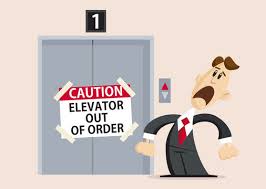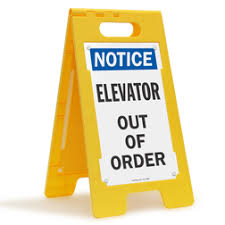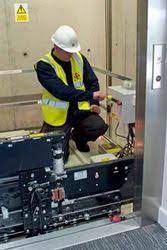 April 2025
April 2025
Condo building elevators are more frequently out of service and taking longer to repair. Building residents are having to climb up to 40 floors while those unable to travel by stairs remain stuck at home. One study, in 2018 by the Auditor General, found that most elevators were not in compliance with safety laws and that the situation was getting worse. Despite only a few elevators posing a serious safety risk, about 80 percent of elevators fail their TSSA inspections each year. What this means, presumably, is that there are “failures” which do not pose a safety risk requiring an elevator to be closed down but which should be addressed.
Ontario has far more elevator inspectors in relation to the number of elevators compared to any other jurisdiction in North America and operate under the strictest elevator codes.
 In under elevated condominium buildings with aging elevators, a lack of elevator mechanics and condo boards failing to maintain elevators properly explain why these problems are unlikely to disappear.
In under elevated condominium buildings with aging elevators, a lack of elevator mechanics and condo boards failing to maintain elevators properly explain why these problems are unlikely to disappear.
Elevator Servicing
Four major companies build 90 per cent of the elevators in Ontario and maintain more than half of them. Elevators may have been installed at reduced rates with maintenance generally charged at above market value. For the first ten years of operation, elevator servicing is typically done by the manufacturer. After this time, a building can hire an independent contractor to service the elevators.
Elevators contain proprietary components which limit who can service it, cost and availability of parts. Parts manufactured overseas can take months for delivery. Condominium buildings will often maintain their service contract with the manufacturer to ensure they can be serviced during an elevator’s 20-to-25-year lifespan.
Elevator companies will often assign one mechanic to about 30 residential buildings. Commercial buildings, where one mechanic can be assigned to two or three buildings, pay more for this level of service.
Failure to Maintain
“Some condo boards choose not to pay for the necessary level of maintenance to ensure elevators remain operational” explains Phil Staite of Quality Allied Elevator. “They may know a part needs to be replaced or that servicing is required even though the elevator is still working. They choose to delay repairs or servicing until failure occurs.” When an elevator eventually stops working, it is out of commission longer, more damage must be repaired and costs are higher. Remaining elevators are under greater strain and can fail faster.
 A higher level of servicing is unappealing to many condo boards focused on not having owners pay a proper level of condo fees to maintain their building.
A higher level of servicing is unappealing to many condo boards focused on not having owners pay a proper level of condo fees to maintain their building.




